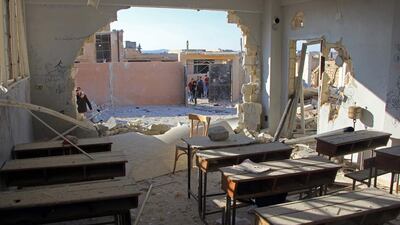Moscow // Russia on Thursday denied carrying out air strikes on a school in Syria’s Idlib province that killed at least 22 children.
“The Russian Federation has nothing to do with this terrible tragedy, with this attack,” foreign ministry spokeswoman Maria Zakharova said, adding that Moscow demanded an immediate investigation.
She said claims that Russian and Syrian warplanes had conducted the air strikes were “a lie”.
The air strikes struck the village of Hass around midday on Wednesday, hitting a residential compound that houses a school complex.
The UN children’s agency Unicef said the school compound was “repeatedly attacked”, and raised the death toll to 22 children and six teachers.
The UN envoy for global education, former British prime minister Gordon Brown, called for a war crimes investigation.
“This is the worst assault on school children among 98 separate attacks on Syrian schools in the last two years,” he said.
“I am calling on the Security Council to immediately agree that the International Criminal Court prosecutor conduct an investigation into what I believe is a war crime.”
Idlib is the main Syrian rebel stronghold, though extremist militant groups also have a large presence there. It has regularly been hit by Syrian and Russian warplanes as well as the US-led coalition targeting ISIL.
Unicef executive director Anthony Lake called the ai rstrikes an “outrage”.
“This latest atrocity may be the deadliest attack on a school since the war began,” Mr Lake. “When will the world’s revulsion at such barbarity be matched by insistence that this must stop?”
Juliette Touma, regional Unicef chief of communication, said Wednesday’s attack was the deadliest attack on a school this year and took the overall death toll of children killed in such attacks in 2016 to 54.
According to Ms Touma, 591 children were killed in 2015 in Syria.
Prior to Wednesday’s attack, the deadliest assault on a school was reported in April 2014 when 30 children were killed in air strikes that hit a school in the rebel-held part of Aleppo city, according to Unicef.
Unicef said it has verified at least 38 attacks on schools this year across Syria, whether in government-held areas or rebel-controlled territory, compared to 60 attacks last year.
“In general there are one in three schools in Syria that can’t be used anymore because they were damaged or destroyed or used for military purposes or sheltering the displaced,” Ms Touma said.
On Thursday, Syria’s state TV said two students were killed and 13 others were wounded by rockets fired by rebel fighters at a school in the government-held western part of Aleppo.
Elsewhere, at least eight people were killed in government shelling of Douma, a rebel-held suburb east of the capital Damascus, according to the Syrian Civil Defence team and the Syrian Observatory for Human Rights monitoring group. The first responders said a child was among dead.
In other developments on Thursday, the UN’s humanitarian official for Syria, Jan Egeland, said efforts would be renewed to secure the evacuation of nearly 200 wounded from eastern Aleppo districts, and allow medical and food supplies into the besieged part of the city which is home to about 275,000 people.
Russia and Syria halted air strikes on eastern Aleppo for three days last week to allow civilians and rebels to leave the area and for the sick and wounded to be evacuated, but Syrian rebels say there have been no safety guarantees for the evacuees.
A government ground offensive attempting to push into the rebel-held part of the city and air strikes have resumed since the three-day truce ended on Saturday.
Mr Egeland said a lack of trust, fear, and misunderstandings, as well as unacceptable preconditions, have prevented evacuations.
“We are not giving up,” Mr Egeland said.
However, he said the Syrian government has denied humanitarian access to eastern Aleppo as part of a monthly UN plan to reach 25 besieged and remote areas in Syria.
“We need to overturn that decision because east Aleppo needs humanitarian supplies, they need it urgently,” Mr Egeland said. “If not ... it will be the worst winter in now the six winters we have had in the conflict.”
The European Union meanwhile said it had put 10 more people under sanctions over the crisis in Syria, targeting high-ranking military officials and senior figures linked to president Bashar Al Assad.
France and Britain pushed hard for the asset freezes and travel bans as a way to respond to the deaths of hundreds of civilians, including children, in Syrian and Russian boming of Aleppo in recent weeks.
However, they were unable to persuade their EU counterparts to impose similar measures on Russian military officials after Rome resisted, worried about upsetting business ties with Moscow.
The EU said it would will publish the names of the 10 people sanctioned on Friday.
As well an oil embargo and a ban on any dealings with the Syrian central bank, the decision takes the number of people on the EU’s Syrian list, which also includes Iranians, to 217. Sixty-nine companies are also under sanctions.
* Agence France-Presse, Associated Press and Reuters

